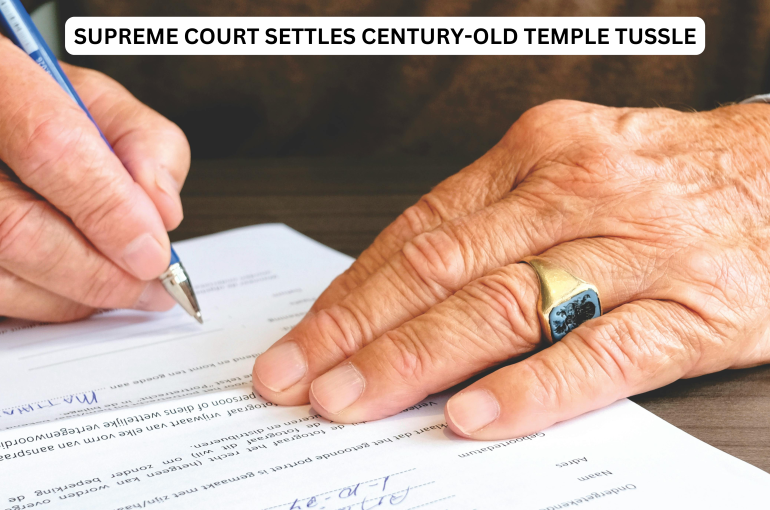SUPREME COURT SETTLES CENTURY-OLD TEMPLE TUSSLE
Introduction:
The Supreme Court of India dismissed the appeal vide Order dated 13-09-2024, in the case of Sri Siddaraja Manicka Prabhu Temple vs The Idol of Arulmighu Kamakala Kameshwarar Temple (Civil Appeal No. 8374 of 2024). The present matter revolves around the ownership and trusteeship of immovable properties adjacent to the Respondent-Petitioner Property Kamakala Kameshwarar Temple. The legal battle, traces back to over a century, about a dispute regarding whether the suit property was privately owned or held in trust for public religious purposes.
Facts:
In the early 20th century, when Rai Raja Eswardoss Diawanth Bahadur owned a significant estate that included the properties in question. Upon his death, the properties passed to his son, T. Lakshmidoss, and grandson, T. Venkataprasad. However, due to financial difficulties, both descendants were declared insolvent in 1914 by the Madras High Court. Consequently, the properties were vested in the Official Assignee.
To resolve the insolvency and to settle debts, a decree was passed in 1915, which divided the estate between Lakshmidoss and Venkataprasad. In 1917, a sale of certain properties, including the suit property, was executed in favor of one W. Ramakrishna Lala, who, in turn, created a trust deed. Under this deed, trustees were appointed to manage the properties, excluding the family house, which later became the subject of the litigation.
Over the years, disputes arose regarding the nature of the Kamakala Kameshwarar Temple and whether it was a private or public institution. Initially, in 1954, the Appellant, Sri Siddaraja Manicka Prabhu Temple, claimed hereditary trusteeship over the Respondent temple and sought to establish it as a private temple. However, a series of legal challenges culminated in the Madras High Court’s decision in 1990, declaring the Kamakala Kameshwarar Temple as a public temple, a decision that was upheld by the Supreme Court in 1991.
After the public nature of the temple was established, a new dispute arose over the ownership of an adjacent immovable property, referred to as the “suit property.” The Respondent, The Idol of Arulmighu Kamakala Kameshwarar Temple, filed a suit in 1999 seeking a declaration of absolute ownership of the suit property and its possession. The Madras High Court ruled in favor of the Respondent, holding that the suit property was part of the temple trust. This judgment was upheld by the Division Bench of the High Court in 2017, leading to the current appeal before the Supreme Court.
Contentions of the Parties
Appellant’s Arguments:
The Appellant, Sri Siddaraja Manicka Prabhu Temple, contended that it held absolute ownership over the suit property. It argued that the Compromise Decree of 1929, which divided the estate of T. Lakshmidoss and T. Venkataprasad, had not converted the suit property into trust property. The Appellant further asserted that the property was transferred to them under a conveyance deed that granted them ownership, not merely trusteeship.
Additionally, the Appellant claimed that the proceedings before the lower courts violated Section 92 of the Civil Procedure Code, which governs suits related to trusts. It was also argued that the Respondent had not raised the issue of the suit property being a trust property in its original pleadings, thereby depriving the Appellant of the opportunity to contest this claim adequately.
Respondent’s Arguments:
On the other hand, the Respondent temple maintained that the suit property was part of a trust created in favor of the Kamakala Kameshwarar Temple for religious and public purposes. The Respondent relied on the Compromise Decree of 1929, which explicitly linked the income generated from the suit property to the maintenance of the temple. According to the Respondent, the Appellant was only a trustee and had no absolute ownership rights.
The Respondent also pointed out that the claim of the Appellant regarding hereditary trusteeship had been conclusively rejected in earlier proceedings. Therefore, it was contended that the principle of res judicata applied, preventing the Appellant from re-litigating issues related to the ownership and trusteeship of the temple property.
Judgment:
After hearing the submissions of both parties, the Supreme Court upheld the decisions of the lower courts and dismissed the appeal. The Court’s judgment focused on several key points:
The Court held that the suit property was indeed part of a trust, as per the 1929 Compromise Decree and the conveyance deeds executed thereafter. The property was to be used for the maintenance and upkeep of the Kamakala Kameshwarar Temple, making it a trust property and not the Appellant’s private property.
The Court agreed with the findings of the Madras High Court that the Appellant had misused the funds generated from the suit property for personal gain, rather than for the temple’s maintenance. As a result, the Appellant had forfeited its position as trustee and was required to hand over possession of the property to the Respondent temple.
The Supreme Court rejected the Appellant’s argument that the current proceedings were barred by the principle of res judicata. The earlier proceedings dealt with the public or private nature of the temple, while the present case concerned the ownership and management of the suit property. Therefore, res judicata did not apply.
The Court dismissed the Appellant’s argument that the suit did not comply with Section 92 of the Civil Procedure Code. Since the property in question was clearly established as trust property, the lower courts were right in their findings that the property should remain under the management of the Respondent temple.
The Supreme Court concluded that the Appellant’s claim of absolute ownership was without merit, as the conveyance deeds and the Compromise Decree explicitly recognized the property’s status as a trust. The Appellant was merely a trustee and not the owner of the property.
The Hon’ble Court upheld the judgement of the Madras High Court and dismissed the Appeal stating that it devoid of merits.
Ashita
Associate
The Indian Lawyer & Allied Services.





































Leave a Reply